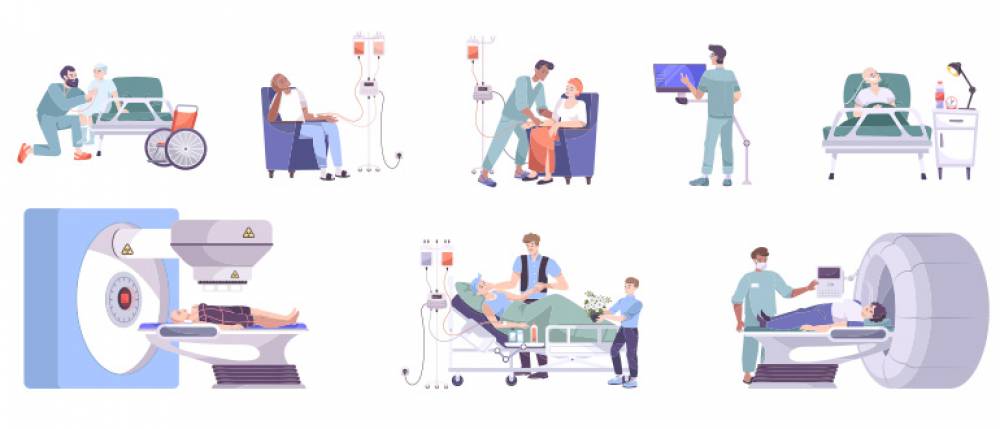Arogyajivan Medical Tourism For Oncology Fundamentals Explained
Arogyajivan Medical Tourism For Oncology Fundamentals Explained
Blog Article
Rumored Buzz on Arogyajivan Medical Tourism For Oncology
Table of ContentsThe Ultimate Guide To Arogyajivan Medical Tourism For OncologyThe 2-Minute Rule for Arogyajivan Medical Tourism For OncologyArogyajivan Medical Tourism For Oncology Things To Know Before You Get ThisEverything about Arogyajivan Medical Tourism For OncologyAll about Arogyajivan Medical Tourism For OncologyThe Buzz on Arogyajivan Medical Tourism For OncologyArogyajivan Medical Tourism For Oncology Fundamentals Explained
If you have cancer cells, your health and wellness care supplier will advise several means to treat the condition. The most usual therapies are surgical treatment, chemotherapy, and radiation. Various other options consist of targeted therapy, immunotherapy, laser, hormone therapy, and others. Below is an introduction of the various treatments for cancer cells and exactly how they function.Cancer cells expand and separate faster than normal cells in the body. Because radiation is most unsafe to swiftly expanding cells, radiation treatment problems cancer cells extra than regular cells. It uses materials made by the body or in a laboratory to aid the immune system job harder or in a much more targeted way to fight cancer cells.
Some have toxic substances or radioactive materials attached to them. Immunotherapy is offered by IV. Hormone treatment is utilized to deal with cancers that are fueled by hormonal agents, such as bust, prostate, and ovarian cancers. It makes use of surgical treatment, or medicines to quit or block the body's natural hormonal agents. This helps reduce the growth of cancer cells.
Thin fibers at the end of the tube guide the light at the cancer cells. Lasers are most usually used with other kinds of cancer cells treatment such as radiation and radiation treatment.
All About Arogyajivan Medical Tourism For Oncology

An oncologist is a cancer cells doctor. Advertising on our website assists sustain our mission. A browse through to an oncologist gives you a possibility to talk with a professional who recognizes what you're going through.
They prepare to help, and they'll stroll with you every action of the method. Oncologists can: Run examines to identify cancerOffer a 2nd opinion on a previous diagnosisIdentify treatment optionsDiscuss each alternative's benefits and side effectsOversee cancer cells treatmentManage post-treatment care Seeing an oncologist doesn't always imply you have cancer cells. An oncologist gets included if you have signs and symptoms that might be cancer cells.
The Ultimate Guide To Arogyajivan Medical Tourism For Oncology
The earlier you get a medical diagnosis, the much better. Many cancers cells are a lot more treatable in the beginning. Cancer is a complex condition. Individuals with cancer cells typically need numerous oncologists on their medical care group. look at this website This multidisciplinary strategy enables each expert to concentrate on a different location of your treatment with a typical goal of collective, thoughtful care - ArogyaJivan Medical Tourism for Oncology.
Radiation can diminish growths prior to surgery or kill staying cancer cells after surgical treatment. You could have radiation as a stand-alone treatment or in mix with various other treatments.
Not known Factual Statements About Arogyajivan Medical Tourism For Oncology
Do I have cancer? How much time have I had it? What will my life appear like now? If these are the inquiries racing via your mind, you're not the only one. Your oncologist is right here to aid you navigate these emotions. During your very first check out, your oncologist will: Ask you to define your signs and symptoms in detailDo a checkupReview your medical records, including household background and any type of past or present wellness conditionsRun any essential examinations (like imaging examinations or laboratory work) to get more information regarding your symptomsDetermine whether you need a biopsyWhen your oncologist collects the info they need, they'll: Talk about the outcomes of your testsSend their findings to the health care service provider who referred youTell you whether you have cancer and if so, what kindTalk to you about different therapy optionsListen to your problems and anxietiesGive you sources that can supply assistance and extra informationYour first oncology browse through might occupy to 3 hours.
Oncology is the study of cancer cells. Specialists educated in oncology offer treatment for people that are at risk for cancer cells, being dealt with for cancer, and living with cancer cells after treatment.

The Ultimate Guide To Arogyajivan Medical Tourism For Oncology
deal with cancer in children and teens. Some sorts of cancer cells take place frequently in these younger age teams. When these kinds of cancer cells occasionally occur in adults, those adult clients may choose to work with a pediatric oncologist. treat cancers inside the chest location, consisting of the lungs and esophagus. ArogyaJivan Medical Tourism for Oncology. deal with cancers in the genitourinary system, such as the bladder, kidneys, penis, prostate gland, and testicles.

Often when cancer cells is suspected but not identified, an oncologist might also be entailed. Lots of people will certainly continue seeing their oncologist for follow-up appointments to examine for indicators of cancer coming back and to manage any kind of side effects from More Bonuses therapy.
All About Arogyajivan Medical Tourism For Oncology
If you have a cancer cells diagnosis and are considering your therapy alternatives, consider participating in a professional trial. Although they might seem daunting in the beginning, clinical trials can be incredibly valuable no issue what type or phase of cancer cells you have. Benjamin Levy, M.D., medical director of the Johns Hopkins Kimmel Cancer Cells Center at Sibley Memorial Medical facility and a lung cancer cells researcher, discusses some of the reasons to sign up with a professional test.
Report this page